仁爱英语八年级上册语法知识点期末复习练习题
仁爱英语2019-2020学年八年级上册语法归纳及练习
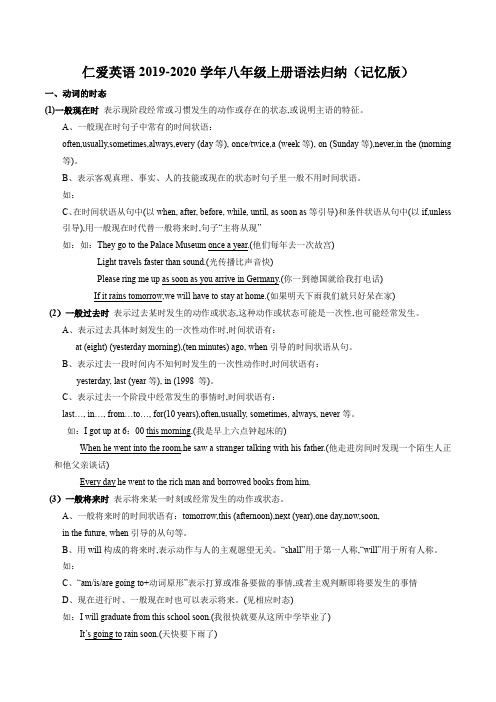
仁爱英语2019-2020学年八年级上册语法归纳(记忆版)一、动词的时态(1)一般现在时表示现阶段经常或习惯发生的动作或存在的状态,或说明主语的特征。
A、一般现在时句子中常有的时间状语:often,usually,sometimes,always,every (day等), once/twice,a (week等), on (Sunday等),never,in the (morning 等)。
B、表示客观真理、事实、人的技能或现在的状态时句子里一般不用时间状语。
如:C、在时间状语从句中(以when, after, before, while, until, as soon as等引导)和条件状语从句中(以if,unless引导),用一般现在时代替一般将来时,句子“主将从现”如:如:They go to the Palace Museum once a year.(他们每年去一次故宫)Light travels faster than sound.(光传播比声音快)Please ring me up as soon as you arrive in Germany.(你一到德国就给我打电话)If it rains tomorrow,we will have to stay at home.(如果明天下雨我们就只好呆在家)(2)一般过去时表示过去某时发生的动作或状态,这种动作或状态可能是一次性,也可能经常发生。
A、表示过去具体时刻发生的一次性动作时,时间状语有:at (eight) (yesterday morning),(ten minutes) ago, when引导的时间状语从句。
B、表示过去一段时间内不知何时发生的一次性动作时,时间状语有:yesterday, last (year等), in (1998 等)。
C、表示过去一个阶段中经常发生的事情时,时间状语有:last…, in…, from…to…, for(10 years),often,usually, sometimes, always, never等。
Unit4+Topic1期末复习 仁爱版八年级英语上册
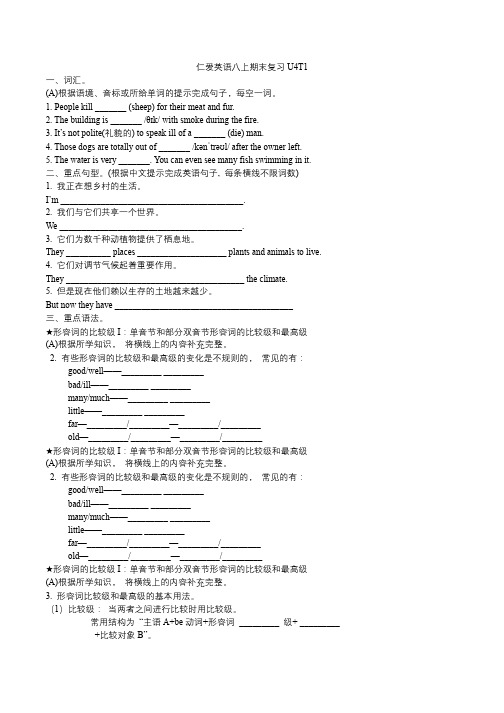
仁爱英语八上期末复习U4T1一、词汇。
(A)根据语境、音标或所给单词的提示完成句子,每空一词。
1. People kill _______ (sheep) for their meat and fur.2. The building is _______ /θɪk/ with smoke during the fire.3. It’s not polite(礼貌的) to speak ill of a _______ (die) man.4. Those dogs are totally out of _______ /kənˈtrəʊl/ after the owner left.5. The water is very _______. You can even see many fish swimming in it.二、重点句型。
(根据中文提示完成英语句子, 每条横线不限词数)1. 我正在想乡村的生活。
I’m _________________________________________.2. 我们与它们共享一个世界。
We _________________________________________.3. 它们为数千种动植物提供了栖息地。
They __________ places ____________________ plants and animals to live.4. 它们对调节气候起着重要作用。
They ________________________________________ the climate.5. 但是现在他们赖以生存的土地越来越少。
But now they have ________________________________________三、重点语法。
★形容词的比较级I:单音节和部分双音节形容词的比较级和最高级(A)根据所学知识,将横线上的内容补充完整。
仁爱英语八年级上册期末复习知识点归纳及练习

仁爱英语2019-2020学年八年级上册期末知识归纳Unit1 Playing SportsTopic1 I’m going to play basketball.1. 常见的感官动词有:see, watch, hear, notice, smell等。
后可接①动词ing形式,表此动作正在发生。
如:“看见某人正在做某事” see sb. doing sth②动词原形,不表此动作正在发生, 表此动作已完成或存在的事实。
如:看见某人做了某事”see sb.do sth.2. hope后可加①hope to do sth.②hope + that从句3. win 过去式为won, winner胜利者.4. Would you like + to do? 表建议或邀请。
常用I’d love to 或I’d be glad to来回答,不同意也常用“I’d love to, but… ” 来拒绝别人。
5. cheer sb on (以欢呼)激励某人,为某人加油,向某人欢呼后接名词,放在cheer on的中间和后面都可以;人称代词,则必须放在中间。
关掉灯turn off the light/turn the light off关掉它turn it off6. prefer 意为“更喜欢”,其后可接名词、动名词或动词不定式。
如:(1)prefer A to B 相比A更喜欢B(2)prefer doing A to doing B 相比做A更喜欢做B(3)prefer to do A rather than do B宁愿做A而不愿做B7. 与how构成的疑问词有:How tall(身高)多高; how high(山)多高;how heavy多重;how long 多长;How wide 多宽;how deep 多深;how old 多大…. (how + adj.)How often 多经常how long 多久8. play for 为某个队效力;play against 与某个队比赛;play with 玩某物/与某人玩9. once a week, 一周一次twice a week一周两次three times a week 一周三次four times a week 一周四次三次或三次以上用“数字+times”扩展:对once a week提问,要用how often提问10. exercise “体操、练习”,可数名词。
仁爱版英语八年级上册主要语法点及练习 共40张
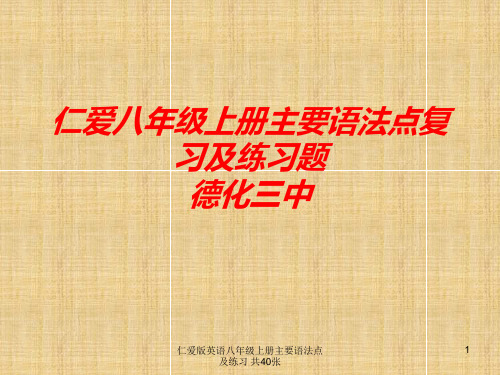
How long did you do your homework?
仁爱版英语八年级上册主要语法点
9
及练习 共40张
1. Don’t shout at him. He is only _______ boy. A. a eight-year-old B. an eight-year-old C. a eight years old D. an eight years old
A. am going C. am
B. am going to D. going to
仁爱版英语八年级上册主要语法点
4
及练习 共40张
Would you mind用法
1.Would you mind (not)doing sth? 2. Would you mind if +从句(如果我做…你会介意吗) 3.Would you please(not) do sth? 4.Could you please (not) do sth?
—_______
A. Oh, it doesn’t matter. B. You’re welcome.
C. That’s OK.
D. Thank you all the same.
仁爱版英语八年级上册主要语法点
8
及练习 共40张
How often, how long
1. —___do you play computer games?
—Every ni
C. How much
D. How often
2. — ___ have you been like this?
—Three days.
A. How long B. How soon
仁爱版八年级上册期末考前复习
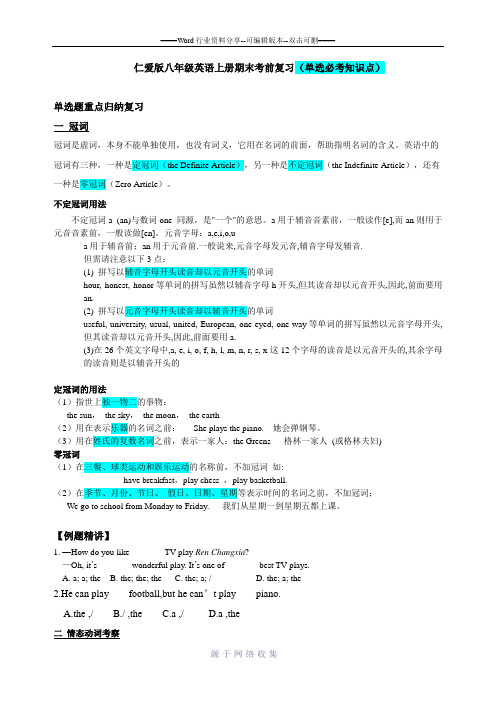
仁爱版八年级英语上册期末考前复习(单选必考知识点)单选题重点归纳复习一冠词冠词是虚词,本身不能单独使用,也没有词义,它用在名词的前面,帮助指明名词的含义。
英语中的冠词有三种,一种是定冠词(the Definite Article),另一种是不定冠词(the Indefinite Article),还有一种是零冠词(Zero Article)。
不定冠词用法不定冠词a (an)与数词one 同源,是"一个"的意思。
a用于辅音音素前,一般读作[e],而an则用于元音音素前,一般读做[en]。
元音字母:a,e,i,o,ua用于辅音前;an用于元音前.一般说来,元音字母发元音,辅音字母发辅音.但需请注意以下3点:(1) 拼写以辅音字母开头读音却以元音开头的单词hour, honest, honor等单词的拼写虽然以辅音字母h开头,但其读音却以元音开头,因此,前面要用an.(2) 拼写以元音字母开头读音却以辅音开头的单词useful, university, usual, united, European, one-eyed, one-way等单词的拼写虽然以元音字母开头,但其读音却以元音开头,因此,前面要用a.(3)在26个英文字母中,a, e, i, o, f, h, l, m, n, r, s, x这12个字母的读音是以元音开头的,其余字母的读音则是以辅音开头的定冠词的用法(1)指世上独一物二的事物:the sun,the sky,the moon,the earth(2)用在表示乐器的名词之前:She plays the piano.她会弹钢琴。
(3)用在姓氏的复数名词之前,表示一家人:the Greens格林一家人(或格林夫妇)零冠词(1)在三餐、球类运动和娱乐运动的名称前,不加冠词如:have breakfast,play chess ,play basketball.(2)在季节、月份、节日、假日、日期、星期等表示时间的名词之前,不加冠词;We go to school from Monday to Friday.我们从星期一到星期五都上课。
仁爱版英语八年级上册主要语法点及练习-完整-(共40张1)ppt课件
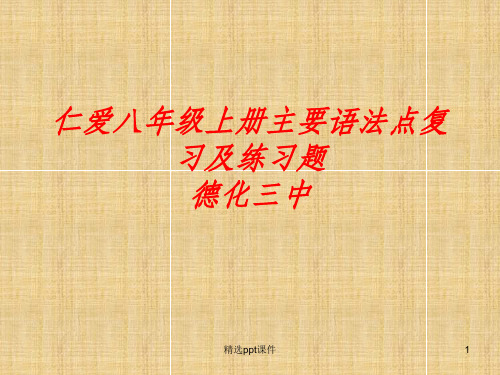
A. I put
B. I putting
C. me put
D. my putting
3.—Would you please _______ so much noise?
—Oh, sorry, I won’t.
A. not make
B. don’t make
C. not to make D. making
精选ppt课件
15
自学
1.—Who taught __ Japanese?
—I learned it by ___.
A. you; myself
B. your; myself
C. yourself; me
D. yourself; myself
2.—He plays basketball so well! Who taught ___?
D. learns; to practice
精选ppt课件
19
花费 spend ,take
1. Sam spends two hours ______his homework every day. A. to do B. doing C. do D. does
2. It takes him two hours ______his homework every day. A. to do B. doing C. do D. does
精选ppt课件
20
--ed,--ing
1. All the Chinese were __ when they heard Liu Xiang won the first. It was really ______. A. exciting, excited B. excited, exciting C. exciting, exciting D. excited, excited
仁爱英语八上知识点复习+习题-U3
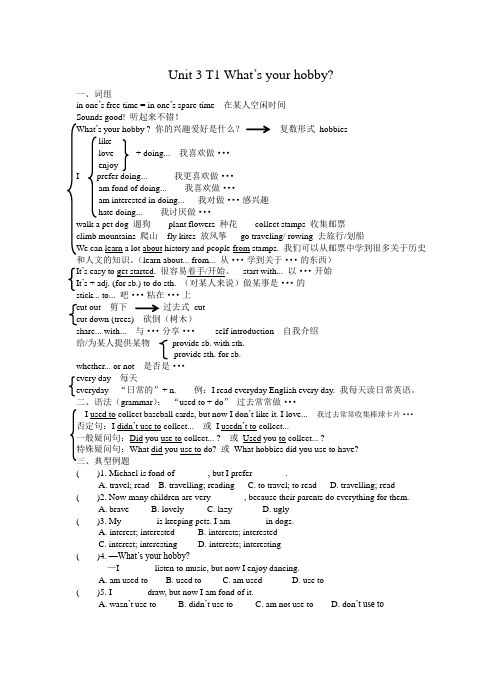
Unit 3 T1 What’s your hobby?一、词组in one’s free time = in one’s spare time 在某人空闲时间Sounds good! 听起来不错!What’s your hobby ? 你的兴趣爱好是什么?复数形式hobbieslikelove + doing... 我喜欢做···enjoyI prefer doing... 我更喜欢做···am fond of doing... 我喜欢做···am interested in doing... 我对做···感兴趣hate doing... 我讨厌做···walk a pet dog 遛狗plant flowers 种花collect stamps 收集邮票climb mountains 爬山fly kites 放风筝go traveling/ rowing 去旅行/划船We can learn a lot about history and people from stamps. 我们可以从邮票中学到很多关于历史和人文的知识。
(learn about... from... 从···学到关于···的东西)It’s easy to get started. 很容易着手/开始。
start with... 以···开始It’s + adj. (for sb.) to do sth. (对某人来说)做某事是···的stick... to... 吧···粘在···上cut out 剪下过去式cutcut down (trees) 砍倒(树木)share... with... 与···分享···self introduction 自我介绍给/为某人提供某物provide sb. with sth.provide sth. for sb.whether... or not 是否是···every day 每天everyday “日常的”+ n. 例:I read everyday English every day. 我每天读日常英语。
(完整)仁爱英语八年级上册语法总结练习,推荐文档

(完整)仁爱英语⼋年级上册语法总结练习,推荐⽂档仁爱英语⼋年级上册语法讲解与练习初中英语⼀般将来时习题⽤法:⼀般将来时表⽰将来某个时间要发⽣的动作或存在的状态,也表⽰将来经常或反复发⽣的动作。
常常与表⽰将来的时间状语连⽤。
常⽤的表达形式共有五种,现归纳如下:⼀、⽤will或shall表⽰。
“助动词will或shall+动词原形”这⼀形式,表⽰将来发⽣的事情,⽤于征求对⽅的意见或表⽰客⽓的邀请。
在⼝语中will⽤于所有⼈称,书⾯语中第⼀⼈称常⽤shall。
如:⼆、⽤be going to结构表⽰。
“be going to+动词原形”⽤来表⽰近期或事先考虑过的将要发⽣的动作以及已有迹象表明必将发⽣某事,意为“打算;就要”。
如:We're going to meet outside the school gate. 我们打算在校门⼝见⾯。
三、⽤现在进⾏时表⽰。
表⽰位置转移的动词(如:go,come,start,move,sail,leave,arrive,stay,fly,等),可⽤现在进⾏时表⽰将来时。
如:They're leaving for Beijing. 他们即将前往北京。
⼀、选择填空:( ) 1. There __________ a meeting tomorrow afternoon.A. will be going toB. will going to beC. is going to beD. will go to be( ) 2. Charlie ________ here next month.A. isn’t workingB. doesn’t workingC. isn’t going to workingD. won’t work( ) 3. He _____ very busy this week, he ____ free next week.A. will be; isB. is; is( ) 4. There _______ a dolphin show in the zoo tomorrow evening.A. wasB. is going to haveC. will haveD. is going to be( ) 5. –________ you ________ free tomorrow?– No. I ________ free the day after tomorrow.A. Are; going to; willB. Are; going to be; willC. Are; going to; will beD. Are; going to be; willbe( ) 6. Mother ________ me a nice present on my next birthday.A. will givesB. will giveC. givesD. give ( ) 7. – Shall I buy a cup of tea for you?–________. (不,不要。
仁爱英语八年级上册单元重点知识复习及练习

知识点梳理一重点语言点1. What’s wrong with you 你怎么了同义句有:What’s the matter/ trouble with you matter/ trouble 是名词,前用the ; wrong 是形容词,前不用the2. 短语:have a cold=catch a cold患感冒;have a cough 患咳嗽;have a fever 发烧;have a stomachache 胃疼;have a headache 头痛 have a sore throat 喉咙疼注意这两个特殊点的I have a headache. = I have an ache in my head. ache 指持续的疼痛,pain 指肉体上的剧烈疼痛,sore常指发炎而引起的肌肉痛3. take a rest = have a rest 休息一下4. lift① 举起lift the box ②消散 The clouds will lift soon ③电梯 get out of the lift5.I don’t feel like eating.feel like doing sth.= want to do sth. 想要做… 如: I feel like running.6. You should lie down and rest.lie down 躺下, lie的现在分词为lying, 过去式为 lay7. You’d better not eat too much candy.1 too much 修饰不可数名词,还可以用来修饰动词,如:①too much money; ② Stay in bed and don’t move yourleg too much.2 too many 修饰可数名词复数,如:too many students3 much too修饰形容词或副词,如:much too expensive8. Let me check it over .check over = look over 检查正误,检查身体如:①Can you check over my homework.②The doctor checked her over and she was fine.9. So I’d like ask for a week’s leave.1 ask for a leave 请假2 ask for a week’s leave 请一周的假3 ask three days’ leave10. I hope I’ll ge t well and return to school soon.1 return to +某地= go/ come back to… 表返回某地,如:Kangkang returned to Beijing.2 return sth. to sb. = give back sth. to sb.表归还某物给某人,如:You must return it to me soon. = You must give it back to me soon.11. I couldn’t read i t until today.否定句+ until...表不能做某事,直到什么时候才能做; 如: I can’t help you until you tell me the truth. 我不能帮助你,直到你告诉我真相我才帮你;12. You should drink plenty of boiled water.plenty of = a lot of 许多的;大量的, 可接可数名词的复数或不可数名词13. How are you feeling today 你今天感觉如何---Much better. 好多了;14. But my left leg still hurts when I move it. 但是我的左腿仍然痛,当我动的时候;hurt①疼痛:My leg hurts ②伤害 He hurt his leg when he fell.15. Staying up late is bad for your health.1 stay up = sit up熬夜, 如:we stayed up until midnight to see the New Year coming.2 动词ing形式动名词可直接放句首作主语,谓语动词用单三形式;16. too little 太少; too much 太多;都用来修饰不可数名词;17. I must ask him to give up smoking.give up doing sth. = stop doing sth. 放弃做某事18. Don’t throw litter about.throw about 到处扔,如:throw litter about= throw about litter litter是名词,即可以放后也可以放中间,但代词只能放中间,如:throw it about19. It will keep you active during the day.1keep + 宾语 + 补语补语可以是:动词ing 形式;形容词;介词短语①I’m sorry to keep you waiting for such a long time. keep sb. doing sth.使某人一直做某事②Keep the door open, please. keep sb/sth+形容词表示某人/某事物保持怎样的状态③Once a cold keep the child in bed for three days keep sb+介词短语表示某人呆在某地2 during the day = in the daytime 在白天20. It may show that something is wrong with your health.1 show sb. sth. = show sth. to sb. 向某人展示某物 please show me your new book.2 show sb. around 某地表带某人参观某地:I’ll show you around our school tomorrow.21. We can get into the human body through the nose.1 get into 进入,陷入; 如:get into trouble 陷入麻烦2 ①through 从物体内部穿过, 如:walk through a forest. ②across 从物体表面横穿,如:go across the road ③ over从物体上空越过, 如:fly over the city22. As we know, good health is more important than wealth. as we know = it is well known众所周知23. We should eat more fruit and less meat.Eat more …. and less …多吃…少吃…24. Different foods help us in different ways.1 food, fruit 等词常作不可数名词,后不加s, 但当强调多种食物或水果时,常用复数形式, 如different foods.2 in different ways 以不同的方式25. It’s necessary for us to have healthy eating habits.句型:It is + 形容词 + for sb. to do sth. it代替后面的不定式对于某人来说,去做某事是…的, 如:It’s useful for us to learn English well.Section A1. Mom, hurry up Dad is on TV.1 ①hurry up 赶快,表催促②hurry to do sth. = do sth. in a hurry 匆忙地做某事He hurried to finish the work. = He finished the work in a hurry.③ hurry to+某地:表匆匆地去某地,如:He hurried to the hospital.= He went to thehospital in a hurry.2 be on TV 某人或某事物上电视;2. May I ask you some questions, Dr. Li---- Sure, go ahead.1 疑问句和否定句中,表“一些”,常用any, 不用some. 但当此疑问句表建议或请求时,Some不改成any. 如:Would you like some tea2 go ahead 请开始吧3. SARS spreads easily among people.1 spread spread, spread 传播,传开 The disease spread allover the country.2 among 表在多者之间, between 在两者之间,常用:between A and B4. 短语:①build up our bodies 使我们的身体强健②crowded places 人群拥挤的地方③take one’s advice = accept one’s advice 接受某人的建议 advice 不可数名词5. Must 开头提出的问句, 否定回答不用mustn’t 来回答,常见的回答如:Must I go now 我必须得走吗肯定回答:Yes, you must.是的,你必须;否定回答:No, you needn’t./ No, you don’t have to. 不,你不必 needn’t= don’t have to6. We had better keep away from animals.keep… away from…让…远离…. 如:You’d better keep the child away from the fire.Section B1. Just a moment, please = wait a moment = Hold on, please.请稍等打电话常用语2. He is busy right now.right now用两种意思:①现在= now ② 马上= right away; ina minute; at once;3. He examining a patient.1 examine = check over 检查2 patient表“①病人②有耐心的”4. 短语:①get through to sb和某人接通电话②leave a message for sb.给某人留口信③give sb. a message = take a message for sb. 给某人捎口信④call sb. back 给某人回电话⑤ask/tell/order sb not to do sth. 叫某人不去做某事5. I`ll tell her when she comes back.她一回来我就告诉她;本句是由when引导的时间状语从句;当主句的动词用一般将来时时,从句一般用现在时;如:He`ll phoneme when he arrives in Beijing .当他到北京时,他将回给我打电话;6. How often does Mr Brown exercise 布朗先生多长时间锻炼一次how often对频率提问,回答用 once/twice/three times-----a day/a week/----- ;exercise在这里为动词,意思是“锻炼,运动”;Section C1. He took an active part in the battle against it.1 take an active part in积极参加….2 against 介词,与…对抗2. He cared for the patients day and night.care for = take care of = look after 照顾,照看3. It is my duty to save the patients.1 此句为主语从句,it 代替 to save the patients2 save 有3种意思:①救②储存 save money ③节约 save water4. Long time no see 好久不见5. How did you spend your time at home 你在家是如何度过的spend + 时间:表度过… I spent my holiday in Beijing. 6. I taught myself on the Internet.1 teach oneself = learn by oneself自学 Michael learned English by himself.2 注意teach 的用法:teach sb. sthMr Liu teaches our English. 改错→ Mr Liu teaches us English. 正确Section Dmust 除了表示“必须”,还表示“一定”,如:Kangkang must be at home. 一定是mustn’t 只指“不准”,can be / may be 可能是; can’t be 不可能是;情态动词: must 与 have to① must "必须;一定”, 表示有做某一动作的必要或义务,侧重表达说话者的主观看法.只有一种时态如:We must wash hands before meals. 饭前我们必须洗手.We must eat healthy food. 我们必须吃健康的食物.② have to “不得不,必须”, 侧重表示因客观条件或客观环境的迫使而"不得不做某事".可用于各种时态如:It’s too late. I have to go now. 太迟了.现在我得走了.I had to borrow some money at that time. 那时我不得不借了一些钱.----Must we keep the windows open all the time---No, we don’t have to. / No, we needn’t. 注意回答时不能用No, we mustn’t.二语法学习1.反身代词的形式单数复数myself ourselvesyourself yourselveshimself /herself/itself themselves2、反身代词的用法1“by+反身代词”表示“单独地,独自一人地”;如:The boy couldn`t make the model plane by himself那个男孩不能独自制作飞机模型;2反身代词常与一些动词连用;如:“teach+反身代词”表示“自学”;“ hurt+反身代词”表示“伤到自己”;如:Jane teaches herself English.简自学英语;Lily fell down and hurt herself yesterday. 昨天莉莉自己摔伤了;注:反身代词与个别动词搭配使用,意思发生变化;如:“help +反身代词+to----”表示“随便吃-----”;“ enjoy+反身代词”表示“-----玩得开心”;Help yourself to some strawberries,please.请随便吃些草莓;They enjoyed themselves at the party last night.昨晚在晚会上他们玩得很开心;3反身代词作名词或代词的同位语时,起加强语气的作用,可译为“亲自,本人”;如:You `d better ask your teacher about it yourself.你最好亲自去问你的老师;三电话用语:Hello Could /May I speak to…, please 你好我能跟……通话吗May I take a message 我能捎个口信吗This is Kangkang. 我是康康.Hello Who’s that 你好你是谁四Reviewbreak the window 打破窗户玻璃get lost 丢失;迷路on one’s way to 在….的路上take the wrong bus 搭错车one of the most popular sports 最受欢迎的运动之一a group of people 一群人form an international organization 成立一个国际组织put sth in low places 把某物放在低处eat sth by mistake 误吃put…away 把…收起来ask for three days’ leave 请三天的假例题句型转换;5分1.We must clean the classroom every day.同义句转换We must _______ the classroom _______ every day.2.It took me two days to finish the book.同义句转换I _______ two days _______ the book.3. You should eat an apple every day.对画线部分提问_______ _______ you do every day4.—May I ask you some questions, Miss Wang对问句作出回答—Sure, go_______.5.They have to get up early every day.改为一般疑问句_______they _______ _______ get up early every day练习词汇;10分A根据句意及首字母提示补全单词;1.Bird Flu can spread easily a_______ birds.2.H_______ up, or we’ll be late.3.Dr. Liu e_______ the sick boy carefully.4.It was b_______ to go into the burning 燃烧的 building.5.Your father is examining a patient. I’ll give him the m_______ later.B用所给词的适当形式填空;6.We’re doctors, so it’s our _______ duty to save patients.7.The road is _______ crowd. Mr. Wang drives his car slowly.8.What causes the _______ ill9.Did they enjoy _______ they in the party yesterday10.—Where is your mother, Beibei—She is busy _______ answer the telephone.作业单项选择;10分1.—Hello May I speak to Mary—_______A.I’m Mary.B.Mary is me.C.This is Mary speaking.D.I’m speaking.2.My mother asked you _______ when you come back.A.ring up herB.ring her upC.to ring up herD.to ring her up3.You should _______ when your parents aren’t at home.A.look yourself afterB.take care for yourselfC.take care yourselfD.take care of yourself4.—May I ask you some questions, Dr. Wang—_______A.You’re welcome.B.Sure, go ahead.C.No, I’m busy.D.Yes, you must.5.—Must I take part in the activity—No, you _______. You’re too young. You should look after yourself.A.mustn’tB.don’tC.can’tD.don’t have to6.—Who taught _______ Japanese—I learned it by _______.A.you; myselfB.your; myselfC.yourself; meD.yourself; myself7. Longlong’s father is a businessman. He is very busy, so Longlong only talks_______ him _______ the phone.A.to; inB.with; byC.with; onD.to; by8.—_______ to keep our classroom clean and tidy.—You are right.A.That’s our dutyB.This is our dutyC.It’s our dutyD.The duty is9.—May I watch TV, Mom—I’m afraid you _______.A.should notB.can’tC.must notD.may not10.She was afraid of _______ SARS because it was dangerous.A.catchB.catchesC.caughtD.catching1. —Must we keep the window ___ all the time —No, you don’t have to.A.openingB.openC.to open2.I’d like some __________ and a kilo of __________.A. sandwich, sausageB. chocolate, tomatoC. beef, potatoes3.—If you feel _______, you should go to school.A.badB.worseC.betterD.good4.If you eat _______ food and take _______ exercise, you’ll keep healthy.A.more; moreB.less; lessC.more; lessD.less; more5.—I can’t keep myself active during the day.—You _______ take more exercise.A.must notB.must beC.need toD.may be6.You had better ask your brother _______ playing computer games. It’s bad for him.A.to give upB.not to give upC.to give it upD.not give it up7.Eating_____ is not good for your health.A. too littleB. much tooC. enough too8. --What’s______--There are great changes everywhere in China.A. going rightB. going onC. going ahead9. He is ______ to take care of himself.A. enough oldB. enoughC. old enough1.He is going to Beijing for at ______________ little a week.2.The Olympic rings ___________ __________ 象征 the five parts of the world.3.Bad news spread easily _________________ 在…中间 people.4.Germs can get into the human body ____________ 通过 the skin and the mouth.5.Many d_______ are caused by germs.6.I want to _______ 选择 a nice gift for her as a birthday present.7.Li Fei likes throwing _______ 垃圾about. That’s not polite.综合填空;5分Frequent 频繁的 hand cleaning is the most important thing you can do because germs are one of the 11 for being ill. It’s especially 尤其 important 12 your hands often during this time of year when germs 13 flu, colds and diarrhea 腹泻 to spread 传播 14 by touching other people, furniture and equipment. Remember, clean hands can keep you15 , so clean them often11._______ 12._______ 13._______ 14._______ 15._______。
期末语法复习(1)仁爱版英语八年级上册

仁爱版八年级英语上册语法复习(1)I. be going to句型.(一).填空.1.He is going (play) basketball this afternoon.2.We (be) going (have)a basketball game against Class Three.3.It (be)going (rain).4. There (be) going to be an evening party this evening.5 They (be) going (swim) after school.6.Lucy is (leave) for Shanghai tomorrow.7.Where you (go) this afternoon?8. What you going (be) when you grow up ?(二).句型转换.1.We are going to play football on Sunday.(改为一般疑问问)going football on Sunday?2.Tom is going to take part in the long jump tomorrow.(改为否定句) Tom going to take part in the long jump tomorrow.3.The girls are going to join the basketball team.(对划线部分提问) the girls ?4.They are going to Shanghai next week.(对划线部分提问)they going ?5.Lucy is going to have a picnic with Lily.(对划线部分提问)Lucy going to have a picnic ?II.mind用法.1.Would you mind (help) me?2.Would you mind (not throw) bottles around?3.Would you mind I try it again?4.Would you mind (I) (close) the window?5.A:Would you mind keeping the window closed?B: .(一点也不介意)6.A:Do you mind not parking here?B: .(当然不介意)7.Would you mind if I smoke here?B: . (你最好不)8.Would you mind giving me a hand?(同义句)give me a hand?III.双宾语.1.Please give me the book. (同义句)Please give .2.He bought a present for me.(同义句)He bought .3.Don't pass the ball to Lucy.(同义句)Don't pass .4.He will give me it.(改错).5.I made a big cake for my grandmother.( 同义句)I made my grandmother .6.Lucy sold a second-hand bike to me. (同义句)Lucy sold .III.情态动词.1.A:Must we exercise to prevent the flu?B: , . / , .3.You’d better (not smoke) here.4.We shouldn't (give) him up .He is just a child.5.Everyone should (try) his best to make it.6.We (must) smoke in public.7.The book be Lucy's. Her name is on it. (must, can, can't)8.The boy be Tom.He left for Beijing yesterday. (must, can, can’t)9. I borrow your bike? (Must, May)10.Lucy may (not know) anything about Lily.ed to和be used to1.I used (go)swimming on Saturdays.2.My mother is used to (get) up early.4.Tom used to live with his grandparents.(变为否定句)Tom to live with his grandparents.5.Lucy used (be) late, but now she is used (come) early.6.She is used to (live) in the country.7.She will be used (read) aloud.8.He (not used) to come.V.接ing 的动词.1.Lucy enjoys (dance) in her free time.2.Tom is fond of (listen) to music.3.He will finish (make) a scrapbook in two hours.4.She often spends much time (play) computer games.5.His mother prefers (dance) to (read).6.She is interested in (collect) stamps.7.We are looking forward to (visit) Nanjing.8.Do you mind (give) me a hand?9.Keep (try),and you will make it.10.You'd better (give) up (smoke).It's bad for your health.11.Lucy often practices (play) the violin. So she plays it well.12.Lucg's mother was busy (cook) when we arrived.13.I'm good at (jump) while Lucy does well in (run).14.I'm sorry to keep you (wait) for me so long.15.She was ill. She didn't feel like (eat) anything.16.Luy has fun (play) with her pet cat .17.I remember (see) you somewhere in Beijing.18. Please stop (talk) aloud.19.He tried ( knock) at the door, but nobody answered.20. They are tired of (do)so much homework.。
仁爱版英语八年级上册语法知识点期末复习练习题
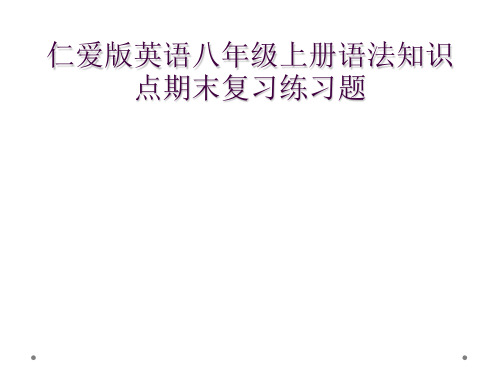
1. —What’s your hobby, please? —I ____ dancing.
A. am fond of
B. enjoy
C. prefer
D. A, B and C
2. — Does your father like collecting stamps? — He isn’t ___ it . He is ___ collecting old clocks . A. fond of,prefers B. enjoys,likes C. prefers, fond of D. interested in, fond of
—Yes, I am.
A. take part in B. join
C. took part in
D. joined
2.—Would you like to climb mountains with me this Sunday?
—I’d love to. But I ____ play table tennis against Class Three.
1.—Would you mind ___here?
—I’m sorry about that. I’ll go somewhere else.
A. no smoking
B. not smoking
C. no smoke
D. not smoke
2. —Would you mind if ___my bike here?
—_______
A. Oh, it doesn’t matter.
B. You’re welcome.
C. That’s OK.
D. Thank you all the same.
- 1、下载文档前请自行甄别文档内容的完整性,平台不提供额外的编辑、内容补充、找答案等附加服务。
- 2、"仅部分预览"的文档,不可在线预览部分如存在完整性等问题,可反馈申请退款(可完整预览的文档不适用该条件!)。
- 3、如文档侵犯您的权益,请联系客服反馈,我们会尽快为您处理(人工客服工作时间:9:00-18:30)。
—_______
A. Oh, it doesn’t matter. B. You’re welcome.
C. That’s OK.
D. Thank you all the same.
How often, how long
1. —___do you play computer games?
—Every night. A. How long
B. When
C. How much
D. How often
2. — ___ have you been like this?
—Three days.
A. How long B. How soon
C. How often D How many
3.翻译:你作业做了多长时间?
How long did you do your homework?
Join , join in,take part in
1.—Would you mind ___ us in the game?
—Not at all. A. joining B. join C. join in D. joining in
2.—When did your school hold the sports meet?
—I’d love to. But I ____ play table tennis against Class Three.
A. am going C. am
B. am going to D. going to
Would you mind用法
1.Would you mind (not)doing sth? 2. Would you mind if +从句(如果我做…你会介意吗) 3.Would you please(not) do sth? 4.Could you please (not) do sth?
1.—Would you mind ___here?
—I’m sorry about that. I’ll go somewhere else.
A. no smoking
B. not smoking
C. no smoke
D. not smoke
2. —Would you mind if ___my bike here?
—Are you going to __ our English team? —Yes, I am. A. take part in B. join
C. took part in D. joined
2.—Would you like to climb mountains with me this Sunday?
1. Don’t shout at him. He is only _______ boy. A. a eight-year-old B. an eight-year-old C. a eight years old D. an eight years old
2. Kangkang won the first place in the __ in the school sports meet last week.
情态动词
1.— Where is li Feng?I can not find him.
— I am not sure. He __in the library.
A. maybe
B.may be
C. must be
D. will be
2. If you have a headache, you ___ lie down for a good rest.
A. I put
B. I putting
C. me put
D. my putting
3.—Would you please _______ so much noise?
—Oh, sorry, I won’t.
A. not make
B. don’t make
C. not to make D. making
八年级上册语法点复习 及练习题
There be句型的一般将来时
1. There __ an English party in our class next week.
A. is going to have B. is going to be
C. will have
D. have
2. There ___ a football match next week. Shall we go and watch it?
A. boy’s 100-meter race B. boys’ 100-meter race C. boy’s 100-meters race D. boys’ 100-meters race
3. —Where is Tom? —He is ill. He’d like to ask for t_h_r_e_e__d_a_y_s_’ (3天的) leave.
—Last week. And I ___ the girls’ 400-metre race.
A. joined
B. took part in
C. will join
D. will take part in
• 我不介意(3)
• ห้องสมุดไป่ตู้关系(3)
• —I’m so sorry for losing your dictionary.
A. will have B. has C. have D. will be
3. There ___ two meetings tomorrow。
A. is going to have B. are going to be
C. will have
D. have
一般将来时
1.be going to do sth 2.will+动词原形
A. shouldn’t
B. had better not
C. had better D. mustn’t
3. —Must I take part in the activity?
—No, you ___. You’re too young. You should look after yourself. A. mustn’t B. don’t C. can’t D. don’t have to
